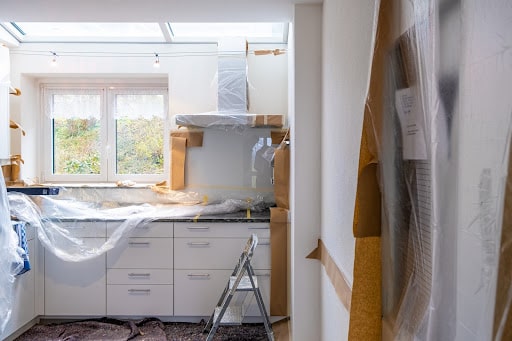10 Tips for Managing a Complex Home Improvements Project (and Staying to Budget)
Embarking on a complex home improvement project and budget can be both exciting and overwhelming as you visualize your dream space turning into reality. However, staying on budget while managing every aspect of the project can be challenging unless you approach it very strategically.
Table of Contents
With careful planning and intelligent decision-making, you’ll complete your project successfully, leaving you with an upgraded space that adds value to your home and your overall life.
How to Finish Your Home Improvement Project Within Budget
In this article, we’ll explore essential tips that can help guide you through the process of managing a complex home improvement project while keeping your finances in check. By following these tips and being mindful of your budget, you can successfully complete your home improvement project without overspending. Remember that careful planning and informed decision-making are key to staying on track financially.
1. Plan Thoroughly and Realistically
When embarking on a complex home improvement project, planning is crucial. Take the time to research your ideas, set a clear vision for your project, and create a detailed budget. Break down costs for materials, labor, and other expenses to avoid unexpected surprises later on.
2. Prioritize Your Needs of Home Improvement Project
Identify the most important aspects of your home improvement project by prioritizing what you need over what you want. By focusing on essentials first, you’ll make better decisions when it comes to allocated tasks and expenditures while staying within your budget constraints.

3. Utilize Technology for Precision
Incorporate technology such as Joist’s deck estimating software into the process to obtain accurate material estimates and streamline communication with contractors or suppliers. This software can keep track of costs and ensure all parties are aware of all necessary adjustments.
4. Hire the Right Professionals for Home Improvement Project
Hiring experienced professionals will prevent potential setbacks that could impact your budget and timeline negatively. Invest time in researching reputable contractors and ask for recommendations from friends or neighbors who have recently undergone similar projects.
5. Establish Good Communication
Proper communication between you and your contractor can make or break a successful home improvement project. Schedule regular meetings to monitor progress, address concerns promptly, and establish open lines of communication so you always stay in the know.
6. Set Realistic Deadlines
Set realistic deadlines for the completion of each phase in your project by taking into account unforeseen circumstances or delays that may occur. Acknowledging potential hurdles can minimize stress by allowing time for problem-solving without impacting your main objectives.
7. Monitor Progress Closely
It’s estimated that fewer than 30% of projects finish on time or within budget. To increase your chances of success, ask for regular updates from contractors. This helps ensure everything goes according to plan while keeping everyone accountable for their respective roles.
8. Be Prepared for Setbacks
Unforeseen challenges are part of any major home improvement project. Be prepared to face obstacles such as weather delays, unexpected costs, or material shortages with a calm and decisive attitude. Having contingency plans in place can help minimize disruptions.
9. Request Itemized Quotes
To gain a clearer understanding of where your budget is being spent, ask for itemized quotes from all suppliers and contractors involved. This transparency will give you better control over finances and make it easier to identify areas that require cost-cutting or additional investments.

10. Review and Reassess Regularly
Finally, don’t be afraid to review and reassess the progress of your project regularly throughout its duration. Continual evaluation allows opportunities for improvements in processes or approaches, ultimately increasing efficiency while maintaining focus on staying within budget.
How to Plan a Home Improvement Project Budget?
- Create a Detailed Budget Spreadsheet. Use a spreadsheet to itemize all the projected expenses. Include categories such as materials, labor, permits, tools, and contingencies.
- Account for Contingency. It’s essential to have a contingency fund in your budget to cover unexpected expenses that may arise during the project. A common practice is to set aside 10-20% of the total budget as a contingency.
- Obtain Multiple Quotes. If you’re hiring contractors or professionals, get quotes from several sources. Compare prices and services to find the best value for your money.
- DIY vs. Professional Labor. Decide which tasks you can handle yourself and which ones require professional help. Labor costs can significantly impact your budget, so consider doing some of the work yourself if you have the necessary skills and time.
- Account for Permits and Fees. Check if your project requires any permits or fees from local authorities. Include these costs in your budget.
- Research Financing Options. If your project exceeds your available funds, explore financing options like home improvement loans or lines of credit. Be sure to factor in any interest or fees associated with these financing options.
- Be Realistic. Be realistic about what you can achieve with your budget. Avoid overestimating your DIY capabilities or underestimating material costs.
- Avoid Scope Creep. Stick to your initial project scope and avoid making significant changes or additions mid-project. Scope creep can lead to cost overruns and delays.
- Reuse and Repurpose. Whenever possible, consider repurposing or reusing existing materials or furniture to save on costs.
- Get Professional Advice. If you’re unsure about certain aspects of the budget or the project’s feasibility, consult with professionals or experts for advice.
In Conclusion: Home Improvement Projects
In conclusion, careful planning, smart decision-making, effective communication, and flexibility are key when managing a complex home improvement project on budget. Embrace these tips to ensure a successful result while maintaining financial control throughout the process.

David is a dynamic, analytical, solutions-focused bilingual Financial Professional, highly regarded for devising and implementing actionable plans resulting in measurable improvements to customer acquisition and retention, revenue generation, forecasting, and new business development.










